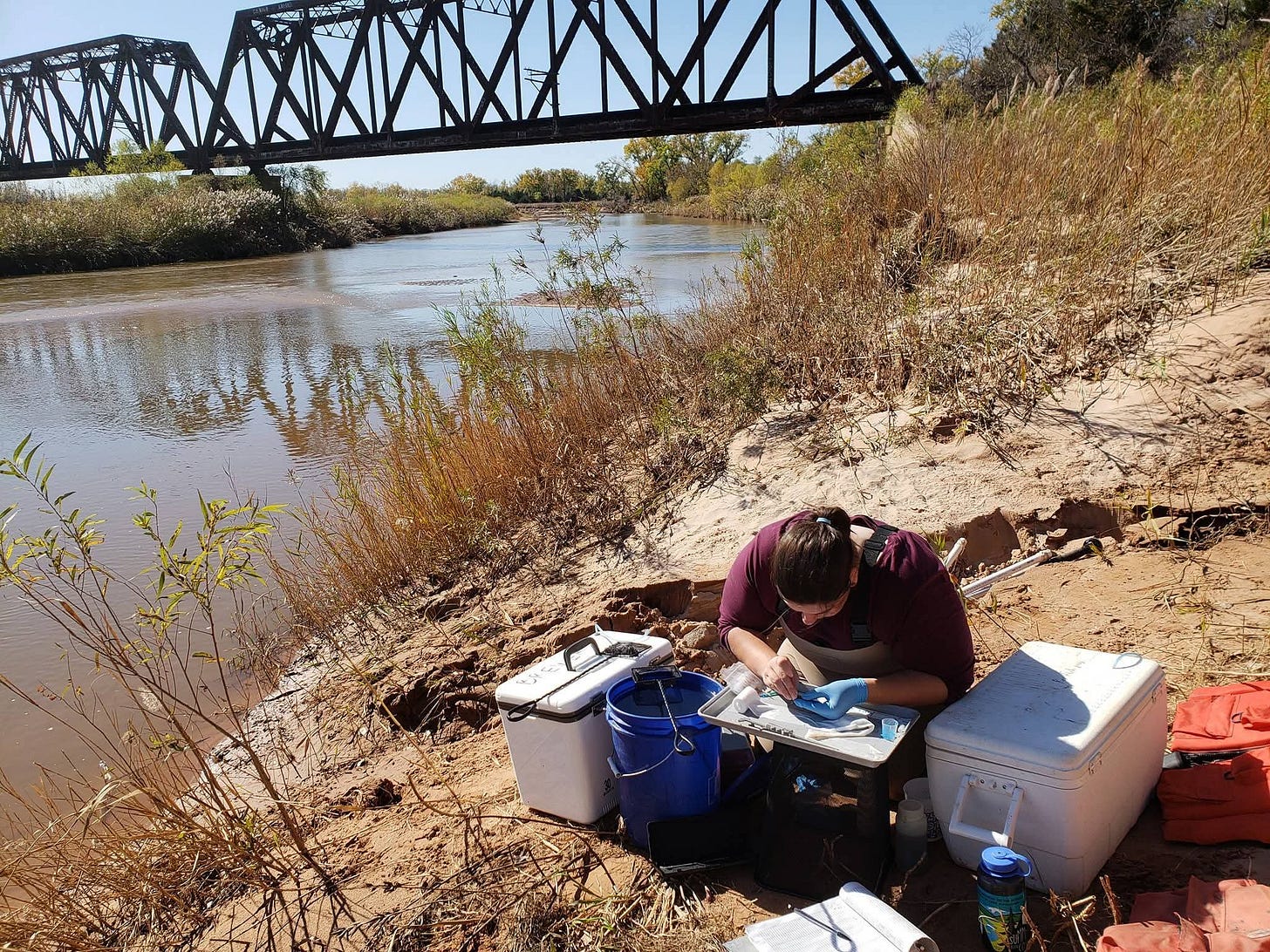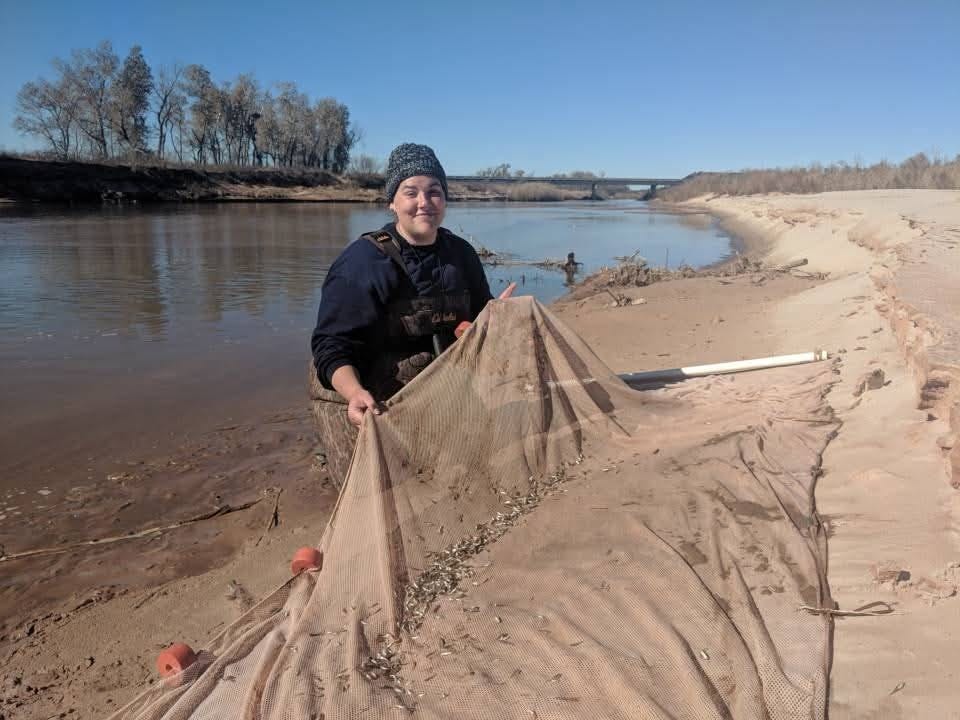Things I Learned From Failing in the Field
From gear disasters to team tension—how mistakes made me a better scientist
Intro – Normalizing Failure
Failure isn’t something we talk about much in science—at least, not publicly.
In papers and grant reports, the story is always neat: we planned, we executed, we discovered.
But anyone who’s spent more than five minutes in the field knows the truth:
Plans fall apart. Gear fails. People mess up.
You forget GPS batteries. Fall into a creek. Lose data. Misidentify a fish in front of someone you were trying to impress.
And when you’re already fighting impostor syndrome or trying to prove you belong, failure can feel like more than just a bad day. It can feel like confirmation of your worst fears.
But here’s the thing: failure isn’t the opposite of progress—it’s part of it. The field has humbled me more times than I can count. And every time something went wrong, I came away with a lesson I couldn’t have learned any other way.
Here are some of the mistakes I’ve made, what they taught me, and why I’m grateful I stuck around long enough to laugh about most of them.
1. When the Gear Betrays You
Picture this: below-freezing temperatures, standing on a steep riverbank, tagging minnows. To scan each fish’s tag, I had to balance the laptop—our data recorder—precariously on a stack of buckets beside me. It was an awkward setup, but it had worked for months.
Until the day it didn’t.
The laptop slid off in slow motion, hit the edge of a bucket, and plunged straight into the river—hard drive first. The second it hit the water, I knew it was toast. Everything was gone.
I was terrified to tell my advisor. It felt like a huge, expensive, irreparable mistake.
I tried everything—dried it in rice, begged the data gods, stared at the power button for hours—but nothing worked. Eventually, I had to make the call. And to my surprise… she didn’t yell. She didn’t fire me. She helped me schedule a repair appointment and gave me advice on how to prevent it from happening again.
The world didn’t end.
What I learned:
Redundancy matters. Always have paper data sheets or a second backup, no matter how solid your digital system seems.
Panic solves nothing. Take a breath. Pause. Then act. Avoiding the problem doesn’t make it go away.
You’re allowed to mess up. Even big mistakes don’t define your worth or competence. One failure doesn’t make you a failure.
2. Weather Chaos Is the Rule, Not the Exception
Winter fieldwork always came with surprises—snowstorms, freezing winds, even sudden floods. I got into a rhythm: checking stream gages to monitor river conditions, layering up with cold-weather gear, mentally bracing for discomfort. I had adjusted pretty well to the routine.
Then came the polar vortex.
It passed upstream of our site and didn’t seem to hit us directly. It was colder than usual, but nothing that felt unmanageable. So we geared up and headed out, ready for another sampling day.
The first red flag was the ice—chunks of it floating downstream, something we’d never seen in this river before. We noted it, thought it was weird, but kept going.
We started by collecting our usual water quality data. The water was so cold that our digital thermometer read: “Error.” That probably should’ve been our second red flag. But I was determined. This was my thesis project, and I didn’t want to lose a sampling day.
Then we began seining—dragging nets through the water to collect fish. Except… all we pulled up was ice. Over and over. The nets froze solid the second they hit the air. Our hands ached. The fish were clearly gone or hunkered down, and every part of the work became harder.
Still, I kept trying. For hours. Hoping stubbornness would get me the data.
Eventually, I called my advisor to ask what else I could try.
She paused, then said something simple that cut through my tunnel vision:
“Why are you wasting your time? Go home and work on something else.”
And just like that, it clicked. I had been so set on pushing through that I missed the obvious: sometimes, the river just says no.
What I learned:
You can’t beat nature. If the conditions aren’t right, you have to wait. The ecosystem doesn’t care about your timeline.
Flexibility is a skill. Fieldwork isn’t clean or consistent—being able to adapt (without guilt) is part of doing good science.
Ambition is great, but wisdom is knowing when to stop.
3. Make a List—Then Actually Check It
As a young biologist, I got a lot of great advice from my advisor. I tried to follow it all pretty well… but I still had a bit of youthful hubris.
One thing she always emphasized was this:
Make a gear list. Check it. Then check it again.
Because when your field site is two hours away, forgetting something can derail your whole day.
So, one morning, I’m loading up the work truck with my list in hand, feeling good and organized. Everything seems accounted for. We hit the road, drive two hours out to the site, suit up in our waders, and start unloading the gear.
That’s when I feel it—that quiet, creeping sense that something’s off. I pause. Look around.
And then it hits me:
I forgot the seines. For seining.
Cue instant shame spiral.
I wasn’t about to admit this to my advisor, so I panicked and called my closest lab mate to see if she had any ideas. Miraculously, she offered to meet me halfway with the seines—which I had left sitting right next to the truck back at the lab. Apparently I didn’t notice them missing in the dark.
I bought her lunch later that week and didn’t confess the mistake to my advisor until I was about to graduate. We laughed about my mistake and still do.
What I learned:
Don’t just make the list—actually follow it. Double-check every item as it goes in the truck.
Invest in your lab mates. Fieldwork friendships are lifesavers—sometimes literally.
Own the embarrassment. Mistakes happen. Laughing at them means they don’t own you.
4. The Emotional Side of Messing Up
Once fieldwork is done, the hard part begins: data analysis.
As a master’s student, I had little experience actually analyzing complex datasets. I had taken several statistics classes to prepare, but classroom examples are clean and forgiving. Field data? Not so much.
I was trying to build a fairly complicated model and kept running into snags—over and over, for weeks. I poured everything into solving it. I cried. I barely slept. I convinced myself I just needed to try harder.
Then one day, my advisor asked why it was taking so long. “Are you just not working on it enough?” she asked.
I broke down. All the frustration and fear I had been holding in came pouring out. I told her how stuck I was, how I felt like I didn’t belong in this career at all.
Her entire tone shifted. She hadn’t known how much I was struggling—because I hadn’t told her. I was trying to tough it out alone, thinking that asking for help would mean I wasn’t cut out for science.
She immediately connected me with someone who specialized in statistics to go through my code. And in the end? The issue was simple. Fixable. I just didn’t know what I didn’t know.
If I had asked for help earlier, I could have saved myself so much pain.
What I learned:
Struggling doesn’t mean you’re failing. It means you’re learning.
Trying on your own is good—but asking for help is just as important.
You’re not weak for feeling things deeply. Emotions are part of the work, too.
Anyone can be a teacher. Collaboration is a strength, not a crutch.
5. The Real Win: I’m Still Here
Fieldwork has humbled me in ways I never expected. I’ve ruined gear, cried over code, fought through self-doubt, and sat alone in a truck wondering if I was cut out for this at all.
But I didn’t quit.
And that’s the real win.
Not the cleanest data. Not the most impressive paper. Not the perfect field season.
The win is that I stayed. Through mistakes, through doubt, through days when everything went wrong—I showed up again. I learned. I got stronger. I kept going.
That matters more than perfection ever could.
We don’t talk about resilience enough in science. We celebrate brilliance, confidence, and achievement—but not always the quiet, gritty persistence it takes to keep going when things feel impossible.
So if you’re in that place—messing up, doubting yourself, wondering if you belong—know this:
You do.
And just showing up is a kind of victory. Some days, it’s the biggest one of all.
If you’ve failed in the field—you’re not alone.
We all have. Every scientist I know has a story they cringe at, laugh about, or learned from the hard way. Mistakes aren’t proof you don’t belong. They’re proof that you’re doing the real, messy work of becoming.
Fieldwork doesn’t reward perfection. It rewards persistence. Curiosity. Adaptability. And the courage to come back after things go sideways.
You are not disqualified by your worst day. You’re shaped by how you grow from it.
Failure isn’t the end of your story.
Sometimes, it’s just the part where you start becoming the scientist you were meant to be.
💬 Have your own “field fail” story? Share it in the comments—I’d love to build a space where we can laugh, learn, and feel a little less alone.
🔁 Know someone who needs to hear this? Pass it along. We’re all learning, one muddy boot at a time.


